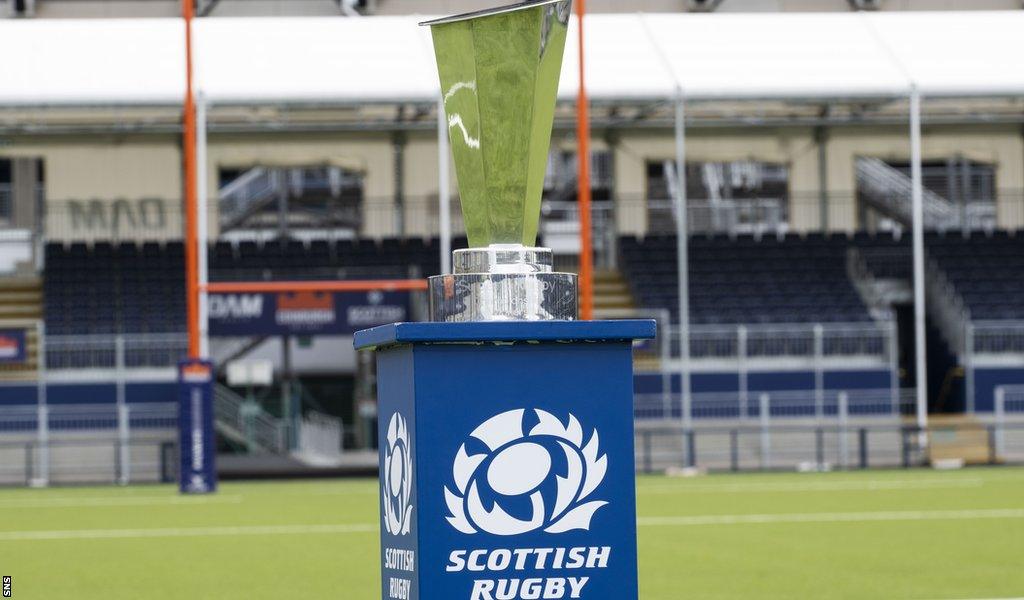Scottish Rugby scraps Super 6 club competition and reinstates national A-team
- Published

The Super 6 Rugby competition has been running for five years
Scottish Rugby is to scrap its Super 6 club series and reinstate a national "A-team" as part of a comprehensive restructure of the professional game.
URC clubs Edinburgh and Glasgow Warriors will also add second-string A fixtures and develop academy structures.
The Super 6 has been a halfway house for five years between the national league and the two URC clubs.
But the six clubs involved will not have their licences renewed.
The competition involving Ayrshire Bulls, Boroughmuir Bears, Heriot's, Southern Knights, Stirling Wolves and Watsonians will end in November.
The clubs will take part in consultation with the SRU's club rugby board on a transition towards a new structure for the domestic game.
Those talks will also involve the current 10 Scottish Premiership sides, with the SRU promising to be "as fair to as many clubs as possible", cause the "least disruption" to the 10-team national league structures and regional leagues.
The new plan is designed to develop more home-grown players and provide "a better alignment between the domestic and professional game".
Scottish Rugby vice-president Keith Wallace, who also chairs the club rugby board, pointed out that: "This has been a very extensive process taking views from across our game and comparisons with other nations.
"It brings a very aligned structure which should see capital invested focused on those with the highest potential and free movement of players.
"It is tailored to suit Scotland and perhaps closest to the successful models of Ireland and New Zealand."
Scotland head coach Gregor Townsend was one of those involved in the review overseen by a steering group that considering recommendations from independent consultant Oakwell.
"It's clear we must do better at creating more opportunities for our young players to gain experiences and develop," he said.
"The game is often the best teacher and we need to provide more games at pro-level and above for those in our U20 and academy environments."
Meanwhile, Scottish Rugby is continuing its recruitment process for a new performance director, who will deliver the detail and implementation of the new pathway programme.
'Stakes incredibly high for Scottish rugby' - analysis
BBC Scotland chief sports writer Tom English
The demise of the Super 6 can't have come as a shock to anybody in Scottish rugby. A controversial creation from its launch five years ago, its end was hinted at strongly last year at the union's agm. Now it's been confirmed.
Super 6 was supposed to be a bridge between the amateur and professional game. It had its successes, but not enough for it to carry on.
What Scottish Rugby announced on Friday was the first thoughts on a huge piece of work, which is still being put together.
All of this has been brought to a head by the abject failure of a succession of Scotland U-20 teams at Six Nations and world level. It all goes back to how Scotland identifies and nurtures its young rugby players. It's a major rethink.
For the longest time, the SRU have performed dismally in this area. Young Scottish players have been under-prepared and under-played and then sent out like sheep among wolves.
The SRU is not hiding away from that. They know they're miles away from other nations in the development of homegrown players. Hence, the unhealthy dependency on residency rules and other loopholes. The new way of thinking is long overdue.
The underage systems in New Zealand are mentioned as a template. France and Ireland give most professional game minutes to under-20s players (in the Top 14 and URC) than any other nation at the elite end of the northern hemisphere game.
This is the most public illustration that the SRU know how much work they need to do.
The fall of the Super 6 is just a necessary part of an overall plan that has to come good for the future of the entirety of Scottish rugby. The stakes are incredibly high.